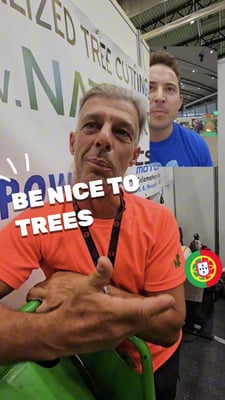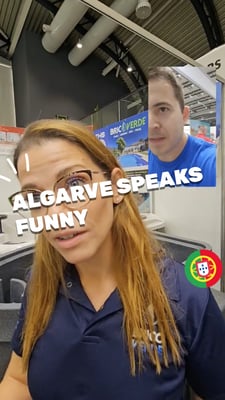Animated: Pizza Na Hora Está a Contratar!
Pizza on Time is Hiring!
This is the third episode of our Pizza Na Hora series (previously audio-only).Márcio o Brasileiro calls in once again to...
Please request our permission before redistributing these files.
- Dono da Pizzaria: Pizza na Hora, boa noite. Pizza Place Owner: Pizza on time, good evening.
- Márcio: Oi, tudo bem? Márcio: Hello, how are you?
- Aqui é o Márcio, brasileiro. This is Márcio, Brazilian.
- Tem uns dias que eu liguei solicitando uma pizza. I called a few days ago to order a pizza.
- Eu estava morando num hotel. I was living in a hotel.
- Agora já estou morando numa casa. Now I’m already living in a house.
- DP: Ah, sei. PPO: Ah, yes.
- Estou a lembrar-me. I remember.
- Faça o seu pedido, por favor. Place your order, please.
- M: Eu gostaria de saber se eu poderia conversar com você. M: I’d like to know if I could talk to you.
- DP: Uh, neste momento não posso conversar, que eu estou a trabalhar. PPO: Uh, right now I can’t talk, because I’m working.
- Tem que usar outro tipo de linhas que não estas para conversar. You’d have to use a different line than this one to talk.
- M: Mas é sobre trabalho mesmo. M: But it’s about work, actually.
- DP: Sobre trabalho? PPO: About work?
- M: Sim. M: Yes.
- Eu solicitei uma pizza com vocês, tem alguns dias, e eu quero fazer um elogio. Eu amei I ordered a pizza from you a few days ago, and I would like to pay my compliments. I loved
- a pizza. the pizza.
- A pizza portuguesa é muito boa. Portuguese pizza is very good.
- DP: Ótimo. PPO: Great.
- M: E eu pensei trazer minha família para morar comigo… M: And I was thinking about bringing my family to live with me…
- DP: Por causa da pizza? PPO: Because of the pizza?
- M: Hm?
- Não! No!
- É que eu gostaria de trazer eles para morar comigo porque eu estou muito sozinho aqui It’s just that I’d like to bring them to live with me because i’m very lonely here
- em Portugal… in Portugal…
- DP: Sim… PPO: Yes...
- M: … E eu pensei que o senhor, por ter uma boa pizzaria e ser muito gentil, poderia me M: … And I thought you sir, since you have a pizza place and you’re very kind, could
- arrumar um emprego. give me a job.
- DP: Uh… PPO: Uh…
- M: Tem emprego? M: Do you have any jobs available?
- DP: Por acaso, neste momento, estamos a contratar, sim. PPO: We happen to be hiring at the moment, yes.
- M: Ai, que bom! M: Ah, good!
- E quais são as vagas? And what are the job openings for?
- DP: Bom, no entanto, não sei se o senhor estará qualificado para as nossas vagas. PPO: Well, however, I don’t know if you would be qualified for our jobs.
- M: Qualificado? M: Qualified?
- Sim, eu sou muito qualificado. Yes, I’m very qualified.
- Tenho 33 anos, 1m83, 78 kg… I’m 33 years old, 6 feet tall, 172 pounds…
- DP: Não são só essas qualificações de que PPO: It's not just these qualifications
- eu estou a falar. I’m talking about.
- M: Ah, desculpa. M: Ah, sorry.
- Já entendi. I got it.
- DP: O senhor… o senhor tem o nono ano de escolaridade obrigatório, reconhecido pelo governo português? PPO: Do you sir… do you sir have the required ninth year of school, recognized by the Portuguese government?
- M: Sim. M: Yes.
- Eu já estudei mais de 16 anos no Brasil. I have studied for over 16 years in Brazil.
- DP: Mas tem equivalência? PPO: But do you have the equivalency?
- M: Sim, tenho equivalência. M: Yes, I’ve got the equivalency.
- DP: Hm.
- E diga-me, o seu registo criminal está limpo? And tell me, is your criminal record clean?
- M: Sim, está limpo. M: Yes, it’s clean.
- Eu nunca fui preso. I’ve never been arrested.
- Eu vou muito à igreja e eu posso orar muito por você. I go to church often and I can pray for you a lot.
- DP: Muito obrigado, mas não preciso que reze por mim. PPO: Thank you very much, but I don’t need you to pray for me.
- Carta de condução de mota seria também um requisito essencial, porque estamos a recrutar A motorcycle license would also be an essential requirement, since we’re hiring
- para a entrega de pizzas. for pizza delivery.
- Tem é um problema, em relação ao seu português. We just have a problem, regarding your Portuguese.
- Exigimos pessoas que tenham um português falado correto. We need people who have correctly spoken Portuguese.
- M: Eu falo correto. M: I speak correctly.
- DP: Uh, mas não o português a que eu estou habituado. PPO: Uh, but it’s not the Portuguese I’m used to.
- M: Mas eu posso trabalhar então internamente, fazendo as pizzas. M: But I can work inside then, making the pizzas.
- DP: Vaga na cozinha? PPO: A spot in the kitchen?
- Sim, também temos. Yes, we also have them.
- M: Sei fazer pizza e lavar louça. M: I know how to make pizza and do the dishes.
- DP: Sim, mas aqui tem que saber fazer as pizzas que nós fazemos. PPO: Yes, but here you gotta know how to make our pizza.
- M: Ah, pizzas portuguesas. M: Ah, Portuguese pizzas.
- DP: Também. PPO: That too.
- M: Eu sei fazer pizza de mussarela, calabresa… Tem mais alguma pizza? M: I know how to make mozzarella, pepperoni pizza… Are here any other pizzas?
- DP: Tem a pizza havaiana. PPO: There’s Hawaiian pizza.
- M: Como? M: Excuse me?
- DP: Pizza havaiana. PPO: Hawaiian pizza.
- M: Desculpa, eu achei que vocês faziam somente pizzas portuguesas. M: Sorry, I thought you were only going to make Portuguese pizza.
- DP: As pizzas são portuguesas porque são feitas em Portugal. PPO: The pizzas are Portuguese because they’re made in Portugal.
- M: Mas você disse havaiana. M: But you said Hawaiian.
- No Brasil, “havaiana” é marca de chinelo. In Brazil, “hawaiian” is a brand of sandals.
- DP: Mas a nossa pizza havaiana é o mesmo que a pizza tropical. PPO: But our Hawaiian pizza is the same as a tropical pizza.
- M: Ah, entendi. M: Ah, got that.
- DP: É aquela que tem ananás. PPO: It’s that one with pineapple.
- Conhece? You know?
- M: Por acaso, não. M: As a matter of fact, I don’t.
- Mas eu sei fazer pizza de abacaxi. But I know how to make pineapple pizza.
- DP: Penso que seja a mesma coisa. PPO: I believe it’s the same thing.
- M: Ah, viu? M: Ah, see?
- Nós estamos falando a mesma língua. We’re speaking the same language.
- Ananás é igual a abacaxi. Ananas is the same as pineapple.
- DP: Correto. PPO: Correct.
- M: O senhor pode ver que eu estou muito qualificado. M: You sir, can see I’m very qualified.
- Eu falo muito bem e eu falo português, mas é português do Brasil, que é um pouco diferente. I speak very well and I speak Portuguese, but it’s Brazilian Portuguese, which is a bit different.
- DP: Ok.
- Pelo menos concordamos numa coisa. At least we agree on one thing.
- Mas diga-me – Então, afinal de contas, porque é que quer trabalhar numa pizzaria? But tell me: So, after all, why do you want to work at a pizza place?
- M: Eu adoro pizza. M: I love pizza.
- DP: Mas também não é bom que venha trabalhar a gostar assim tanto de pizza. PPO: But it’s not good for you to come to work while enjoying pizza that much.
- M: Eu posso levar pizza para minha casa se sobrar? M: Can I bring some pizza home if there are leftovers?
- DP: Não! PPO: No!
- Aí é que está. There it is.
- M: Mas vai jogar fora! M: But you’ll throw it away!
- DP: É para ir fora, não é para levar para sua casa. PPO: It’s supposed to be thrown away, not for you to take home.
- M: Ah, entendi. M: Ah, got it.
- DP: As poucas sobras que temos, nós damos aos pobres. PPO: The few leftovers we have, we give to the poor.
- M: Eu preciso ter algum documento? M: Do I need to have any documents?
- DP: Uh, precisa. PPO: Uh, you do.
- Precisa de ter o comprovativo do nono ano de escolaridade obrigatório… You need to have the statement for the obligatory ninth year of school…
- M: Por favor, fale um pouco devagar, que eu vou anotar. M: Please, speak slowly, I’m going to write this down.
- DP: Vou repetir. PPO: I’ll repeat.
- M: Obrigado. M: Thank you.
- DP: Precisa do comprovativo do nono ano de escolaridade obrigatório ou equivalente… PPO: You need the statement for the obligatory ninth year of school or equivalent…
- M: Pode ser comprovante? M: Could it be a certificate?
- Comprovativo eu não tenho. I don’t have a statement.
- DP: É capaz de ser a mesma coisa. PPO: It’s probably the same thing.
- Tem de trazer o comprovativo do registo criminal, para comprovar que está limpo, e precisa You have to bring the criminal record statement, to prove that you’re clean, and you also
- de trazer também a sua carta de condução de mota. need to bring your motorcycle license.
- M: Moto. M: Motorbike.
- DP: Mota. PPO: Motorcycle.
- M: Deve ser a mesma coisa. M: It’s probably the same thing.
- DP: É, julgo que sim. PPO: Yes, I believe so.
- M: Eu não tenho moto. M: I don’t have a motorbike.
- DP: Mas nós temos as nossas motas. PPO: But we have our motorcycles.
- M: Ai, que bom. M: Ah, good.
- E eu posso usar na minha casa? And can I use it at my place?
- DP: Não. PPO: No.
- Apenas e somente para entrega das nossas pizzas. It’s just and only for delivering our pizzas.
- M: Ah, para a entrega das pizzas. M: Ah, to deliver the pizzas.
- Tem algum GPS que eu possa utilizar? You got any GPS I can use?
- Porque eu conheço pouco as ruas de Lisboa. Because I know little of the streets of Lisbon.
- DP: Não. PPO: No.
- M: Algum mapa? M: Any maps?
- DP: Não. PPO: No.
- Terá de usar do seu smartphone, por exemplo. You’ll have to use your smartphone, for example.
- M: Smartphone? M: Smartphone?
- Eu não sei o que é. I don’t know what that is.
- Você pode me dizer? Can you tell me?
- DP: É um telefone inteligente. PPO: It’s a smart phone.
- M: Ah, um telefone celular! M: Ah, a cellphone!
- DP: Sim. PPO: Yes.
- Se o seu telemóvel tiver GPS, poderá utilizá-lo. If your mobile phone has GPS, you can use it.
- No entanto, tem que estar atento à estrada. However, you have to pay attention to the road.
- M: Vamos falar então em valores. M: Let’s speak of numbers, then.
- Vou receber em euro ou reais? Will I be paid in euros or reais?
- DP: Você está em Portugal, portanto, obviamente, receberá em euros. PPO: You’re in Portugal, so, obviously, you’ll be paid in euros.
- M: Ah.
- Você vai me dar o dinheiro em mãos ou em uma conta bancária? Will you pay me in cash or via bank account?
- DP: Será depositado na sua conta. PPO: It will be deposited in your bank account.
- M: Pode ser a do Brasil? M: Could it be the one in Brazil?
- DP: Não. PPO: No.
- Terá de ser uma conta portuguesa. It will have to be a Portuguese account.
- M: Posso fazer outra pergunta? M: May I ask another question?
- DP: Diga! PPO: Say it!
- M: Vocês vão dar uniforme? M: Will you give me a uniform?
- DP: Sim, temos uma farda. PPO: Yes, we have an attire.
- M: Farda, quem usa é policial. M: Uniforms are worn by officers.
- DP: E o senhor, se trabalhar connosco, também terá uma farda. PPO: And you sir, if you work with us, will have an attire as well.
- M: Ah.
- Não sei o que é, mas acredito que eu vou gostar muito. I don’t know what it is, but I believe I’ll like it very much.
- DP: Homem, é o mesmo que uniforme! PPO: Man, it’s the same as a uniform!
- M: Ah, entendi. M: Ah, got that.
- Que bom, não vou precisar comprar roupa. Good, I won’t need to buy clothes.
- DP: Não, não precisa. PPO: No, you don’t need to.
- Só roupa interior. Only underwear.
- Cuecas lavadas todos os dias, de preferência, para não termos queixas dos nossos clientes. Clean underwear every day, preferably, so we don’t get complaints from our customers.
- M: Ah, ótimo. M: Ah, great.
- Que horas que eu posso passar para a entrevista? At what time can I stop by for the interview?
- DP: Dentro do nosso horário. PPO: During our working hours.
- Estamos abertos do meio-dia até à meia-noite. 12 horas por dia, 365 dias por ano. We’re open from noon to midnight. 12 hours a day, 365 days a year.
- M: Como?! M: Excuse me?!
- 12 horas por dia, durante todos os dias do ano? 12 hours a day, every day of the year?
- Quer dizer que eu não vou ter férias?! You mean I won’t have vacation time?!
- DP: Não. PPO: No.
- M: Mas eu preciso passear com a minha família. M: But I need to spend time with my family.
- DP: Homem, como é óbvio, eu estou a gozar consigo. PPO: Man, it’s obvious, I’m joking with you.
- M: Gozar? M: Joking?
- DP: Sim. PPO: Yes.
- Estou a gozar consigo. I’m joking with you.
- M: Ah, assim você está tirando um sarro da minha cara. M: Ah, then you’re making fun of me.
- ‘Tá, vamos pular esse assunto. Ok let’s skip this subject.
- Terei ou não folgas? Will I have days off or not?
- DP: Claro que terá folgas e férias e trabalhará apenas oito horas por dia, conforme a lei PPO: Of course you will have days off and vacation and you’ll only work eight hours a day, according to
- prevê. the law.
- M: Eu posso almoçar no serviço? M: Can I have lunch during work?
- DP: Terá a sua hora de almoço. PPO: You’ll have your lunch hour.
- M: Ah. M: Ah.
- Preciso levar comida de casa ou comerei pizza? Do I need to bring food from home or will I eat pizza?
- DP: Desde que pague as nossas pizzas, pode comer as nossas pizzas. PPO: As long as you pay for our pizzas, you can eat our pizzas.
- M: Vou ter descontos? M: Will I have a discount?
- DP: Isso são outros assuntos que depois falaremos mais tarde. PPO: This is a different subject we’ll talk about later.
- M: E para a entrevista, eu tenho que levar alguma roupa especial? M: And for the interview, do I have to bring any special outfit?
- DP: Convém vir apresentável. PPO: Being presentable is advisable.
- M: Ah.
- Um banho tomado. Take a shower.
- DP: Sim, de preferência. PPO: Yes, preferably.
- M: Quando eu chegar na pizzaria, eu me apresento para quem? M: When I arrive at the pizza place, who should I introduce myself to?
- DP: Peça para chamar o dono da pizzaria, que sou eu. PPO: Ask for the pizzaria’s owner, which is me.
- M: ‘Tá. M: Ok.
- O dono da pizzaria deve ter nome. The pizzaria owner must have a name.
- DP: Sou eu. PPO: It’s me.
- M: Então, chegando na pizzaria, eu vou te procurar. M: So, when I get there, I’ll look for you.
- DP: Entrega toda a sua documentação e pode ir embora. PPO: You hand us over all your documentation and you can go.
- M: Preciso deixar o número do meu celular? M: Do I have to leave my cellphone number?
- DP: Sim, deixe o seu número de telemóvel que depois entraremos em contacto consigo. PPO: Yes, leave your mobile phone number that we’ll get in touch with you.
- M: Ah, ok. M: Ah ok.
- Muito obrigado, senhor dono da pizzaria. Thank you very much, Mr. pizza place owner.
- DP: De nada, de nada. PPO: You’re welcome, you’re welcome.
- Agora, vamos despachar esta conversa que eu tenho mais clientes para atender. Now, let’s hurry this conversation because I have more clients to serve.
- M: Só um minutinho. M: Just a minute.
- Eu gostaria de pedir uma pizza. I’d like to order a pizza.
- DP: Quer pedir uma pizza agora? PPO: You want to order a pizza now?
- M: Sim! M: Yes!
- DP: Ai, homem, peça lá, então, mas rápido, que eu tenho mais clientes para atender. PPO: Oh, man, order then, but fast, because I have more clients to serve.
- M: Pois bem, eu quero uma pizza portuguesa… M: Very well, I want a Portuguese pizza…
- DP: Sim… PPO: Yes…
- M: … Com recheio de… Ah, uma perguntinha! M: … topped with… Ah, a little question!
- DP: Diga. PPO: Yes.
- M: Tem frango? M: Do you have chicken?
- DP: Não. PPO: No.
- Não temos frango. We don’t have chicken.
- M: Ai, que bom. M: Ah, good.
- Então, quero uma pizza de milho. So I’ll want a corn pizza.
- DP: De milho… Hoje temos milho. PPO: Corn… Today we have corn.
- M: Ótimo! M: Great!
- Com champignons… With champignons…
- DP: Perdão? PPO: Pardon?
- M: Champignons. M: Champignons.
- DP: Perdão? PPO: Pardon?
- M: Champignons! M: Champignons!
- DP: Champignons? O que é isso? PPO: Champignons? What's that?
- M: Uh… Cogumelos. M: Uh… Mushrooms.
- DP: Ah, cogumelos. PPO: Ah, mushrooms.
- Sim, mais. Yes, more.
- M: Ovo ralado. M: Shredded egg.
- DP: Ovo ralado? PPO: Shredded egg?
- Nós não ralamos o ovo. We don’t shred the eggs.
- É ovo cozido às fatias. It’s sliced boiled egg.
- M: Ótimo. M: Great.
- DP: Ovo cozido… Mais. PPO: Boiled egg… More.
- M: Rúcula. M: Arugula.
- DP: Rúcula não temos. PPO: We don’t have Arugula.
- M: Não? M: No?
- DP: Não. PPO: No.
- M: Salmão. M: Salmon.
- DP: Salmão também não. PPO: Don’t have salmon either.
- M: Alho – poró. M: Leek.
- DP: Alho quê? PPO: What?
- M: Alho – poró. M: Leek.
- DP: Não sei o que isso é. PPO: I don’t know what that is.
- M: Eu acho que vocês dizem alho francês. M: I believe you call it french garlic.
- Já vi no supermercado. I’ve seen it at the supermarket.
- DP: Ah, alho francês! PPO: Ah, french garlic!
- Homem, então, se sabe, faça-se entender! Man, if you know then, explain it!
- Pronto, alho francês. There, french garlic.
- Sim, temos. Yes, we have it.
- E que mais? What else?
- M: Pimentão vermelho. M: Red bell pepper.
- DP: Pimentão? PPO: Bell pepper?
- Nós temos pimento vermelho, verde e amarelo. We have red, green and yellow bell pepper.
- Pimentão é uma especiaria; é só o vermelho. Pepper is a spice; it’s just the red one.
- M: Pode ser. M: It’s fine.
- DP: Mais. PPO: More.
- M: Posso colocar mais quantos ingredientes? M: How many more ingredients can I add?
- DP: Os que quiser, desde que os pague. PPO: How many you want, as long as you pay for them.
- M: Então, está bom. Cebola... M: Ok, then. Onions...
- DP: Cebola… Roxa ou normal? PPO: Onions… Red or normal?
- M: Normal. M: Normal.
- DP: Não temos. PPO: We don’t have it.
- Só roxa. Just red.
- M: Pode ser. M: It’s fine.
- DP: Mais. PPO: More.
- M: Catupiry. M: Catupiry.
- DP: Desculpe? PPO: I’m sorry?
- M: Catupiry. M: Catupiry.
- DP: Não sei o que isso é. PPO: I don’t know what that is.
- Não temos. We don’t have it.
- M: Catupiry é um queijo. M: Catupiry is a cheese.
- DP: Pronto. PPO: There.
- Mais. More.
- Rápido. Quick.
- M: Azeitonas pretas. M: Black olives.
- DP: Só temos as verdes. PPO: We only have green ones.
- M: Pode ser. M: It’s fine.
- Tenho certeza que essa pizza vai ficar ma-ra-vi-lho-sa. I’m sure this pizza will be won-der-ful.
- DP: Com certeza que vai. PPO: I’m sure it will.
- Mais alguma coisa? Anything else?
- M: Não, só isso. M: No, that’s all.
- Qual o valor, senhor dono? What’s the price, Mr. owner?
- DP: Ora bem, com todos estes ingredientes, será um total de 48 euros. PPO: Well, with all these ingredients, it will be a total of 48 euros.
- M: Meu deus, 48 euros! M: My god, 48 euros!
- Vamos fazer o seguinte – Como tenho a certeza que vou ser contratado, pode descontar o valor Let’s make a deal – As I’m sure I will be hired, you can deduct the amount
- do meu próximo salário. from my next salary.
- É preciso ter lata! You gotta have nerve!
- Esperamos que este e os próximos episódios sejam úteis e que te permitam aprender algo novo. We hope that this and the next episodes are useful and allow you to learn something new.
- Se gostas do nosso podcast vai ao nosso website, www.practiceportuguese.com If you enjoy our podcast, visit our website, www.practiceportuguese.com
- e deixa um comentário, ideia ou sugestão. and leave us a comment, idea or suggestion.
- Só com a tua ajuda podemos crescer na direcção certa. Only with your help we can grow in the right direction.
- E não te esqueças... And don’t forget…
- Ouvir um português falar é a melhor forma de estudar! Até à próxima! Listening to a Portuguese speaker
- É preciso ter lata! You gotta have nerve!
Vocabulary
o alho-francêsleek vegetable o ananáspineapple O cogumelomushroom As cuecasunderpants / boxers despacharto hurry, speed up, do quickly, finish up, dispatch a leilaw O pimento vermelhored pepper a queixacomplaint recrutarto recruit A rúculaArugula, rocket As sobrasleftovers Expressions
O dia de folgaday off Afinal de contasafter all Fazer-se entendermake oneself understood Ter latato have some nerve (alt. ter uma grande lata) o ano de escolaridadeschool year Desde queAs long as, Provided that View original post
 Luís
Luís Márcio
Márcio











